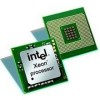Intel X5472 Specification Update - Page 33
MOV SS/POP SS Instruction if it is Followed by an Instruction
 |
UPC - 735858201551
View all Intel X5472 manuals
Add to My Manuals
Save this manual to your list of manuals |
Page 33 highlights
AX52. Short Nested Loops That Span Multiple 16-Byte Boundaries May Cause a Machine Check Exception or a System Hang Problem: Under a rare set of timing conditions and address alignment of instructions in a short nested loop sequence, software that contains multiple conditional jump instructions and spans multiple 16-byte boundaries, may cause a machine check exception or a system hang. Implication: Due to this erratum, a machine check exception or a system hang may occur. Workaround: It is possible for the BIOS to contain a workaround for this erratum. Status: For the steppings affected, see the Summary Tables of Changes. AX53. IA32_MC1_STATUS MSR Bit[60] Does Not Reflect Machine Check Error Reporting Enable Correctly Problem: IA32_MC1_STATUS MSR (405H) bit[60] (EN- Error Enabled) is supposed to indicate whether the enable bit in the IA32_MC1_CTL MSR (404H) was set at the time of the last update to the IA32_MC1_STATUS MSR. Due to this erratum, IA32_MC1_STATUS MSR bit[60] instead reports the current value of the IA32_MC1_CTL MSR enable bit. Implication: IA32_MC1_STATUS MSR bit [60] may not reflect the correct state of the enable bit in the IA32_MC1_CTL MSR at the time of the last update. Workaround: None identified. Status: For the steppings affected, see the Summary Tables of Changes. AX54. An Enabled Debug Breakpoint or Single Step Trap May Be Taken after MOV SS/POP SS Instruction if it is Followed by an Instruction That Signals a Floating Point Exception Problem: A MOV SS/POP SS instruction should inhibit all interrupts including debug breakpoints until after execution of the following instruction. This is intended to allow the sequential execution of MOV SS/POP SS and MOV [r/e]SP, [r/e]BP instructions without having an invalid stack during interrupt handling. However, an enabled debug breakpoint or single step trap may be taken after MOV SS/POP SS if this instruction is followed by an instruction that signals a floating point exception rather than a MOV [r/e]SP, [r/e]BP instruction. This results in a debug exception being signaled on an unexpected instruction boundary since the MOV SS/POP SS and the following instruction should be executed atomically. Implication: This can result in incorrect signaling of a debug exception and possibly a mismatched Stack Segment and Stack Pointer. If MOV SS/POP SS is not followed by a MOV [r/e]SP, [r/e]BP, there may be a mismatched Stack Segment and Stack Pointer on any exception. Intel has not observed this erratum with any commercially available software, or system. Workaround: As recommended in the IA-32 Intel® Architecture Software Developer's Manual, the use of MOV SS/POP SS in conjunction with MOV [r/e]SP, [r/e]BP will avoid the failure since the MOV [r/e]SP, [r/e]BP will not generate a floating point exception. Developers of debug tools should be aware of the potential incorrect debug event signaling created by this erratum. Status: For the steppings affected, see the Summary Tables of Changes. AX55. Problem: A VM Exit Due to a Fault While Delivering a Software Interrupt May Save Incorrect Data into the VMCS If a fault occurs during delivery of a software interrupt (INTn) in virtual-8086 mode when virtual mode extensions are in effect and that fault causes a VM exit, incorrect data may be saved into the VMCS. Specifically, information about the software interrupt 33 Intel® Xeon® Processor 5400 Series Specification Update















